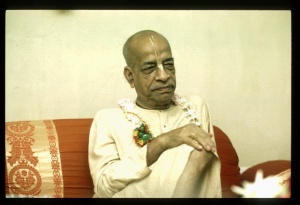SB 11.14.17: Difference between revisions
m (1 revision(s)) |
No edit summary |
||
| Line 1: | Line 1: | ||
{{info | {{info | ||
|speaker=Lord | |speaker=Lord Kṛṣṇa the Supreme Personality of Godhead | ||
|listener=Uddhava | |listener=Uddhava | ||
}} | }} | ||
[[Category:Srimad-Bhagavatam - Canto 11 Chapter 14]] | |||
[[Category:Bhagavatam Verses Spoken by Lord Krsna - Vanisource|111417]] | |||
<div style="float:left">'''[[Srimad-Bhagavatam]] - [[SB 11|Eleventh Canto]] - [[SB 11.14: Lord Krsna Explains the Yoga System to Sri Uddhava|Chapter 14: Lord Kṛṣṇa Explains the Yoga System to Śrī Uddhava]]'''</div> | |||
<div style="float:right">[[File:Go-previous.png|link=SB 11.14.16]] '''[[SB 11.14.16]] - [[SB 11.14.18]]''' [[File:Go-next.png|link=SB 11.14.18]]</div> | |||
{{RandomImage}} | |||
{{SBnotice}} | |||
==== TEXT 17 ==== | ==== TEXT 17 ==== | ||
<div | <div class="verse"> | ||
niṣkiñcanā mayy anurakta-cetasaḥ | :niṣkiñcanā mayy anurakta-cetasaḥ | ||
śāntā mahānto 'khila-jīva-vatsalāḥ | :śāntā mahānto 'khila-jīva-vatsalāḥ | ||
kāmair anālabdha-dhiyo juṣanti te | :kāmair anālabdha-dhiyo juṣanti te | ||
yan nairapekṣyaṁ na viduḥ sukhaṁ mama | :yan nairapekṣyaṁ na viduḥ sukhaṁ mama | ||
</div> | </div> | ||
| Line 17: | Line 22: | ||
==== SYNONYMS ==== | ==== SYNONYMS ==== | ||
<div | <div class="synonyms"> | ||
niṣkiñcanāḥ—without any desire for sense gratification; mayi—in Me, the Supreme Lord; anurakta-cetasaḥ—mind constantly attached; śāntāḥ—peaceful; mahāntaḥ—great souls without false ego; akhila—to all; jīva—living entities; vatsalāḥ—affectionate well-wishers; kāmaiḥ—by opportunities for sense gratification; anālabdha—untouched and unaffected; dhiyaḥ—whose consciousness; juṣanti—experience; te—they; yat—which; nairapekṣyam—achieved only by complete detachment; na viduḥ—they do not know; sukham—happiness; mama—My. | niṣkiñcanāḥ—without any desire for sense gratification; mayi—in Me, the Supreme Lord; anurakta-cetasaḥ—mind constantly attached; śāntāḥ—peaceful; mahāntaḥ—great souls without false ego; akhila—to all; jīva—living entities; vatsalāḥ—affectionate well-wishers; kāmaiḥ—by opportunities for sense gratification; anālabdha—untouched and unaffected; dhiyaḥ—whose consciousness; juṣanti—experience; te—they; yat—which; nairapekṣyam—achieved only by complete detachment; na viduḥ—they do not know; sukham—happiness; mama—My. | ||
</div> | </div> | ||
{{SBcollapse}} | |||
==== TRANSLATION ==== | ==== TRANSLATION ==== | ||
<div | <div class="translation"> | ||
Those who are without any desire for personal gratification, whose minds are always attached to Me, who are peaceful, without false ego and merciful to all living entities, and whose consciousness is never affected by opportunities for sense gratification—such persons enjoy in Me a happiness that cannot be known or achieved by those lacking such detachment from the material world. | Those who are without any desire for personal gratification, whose minds are always attached to Me, who are peaceful, without false ego and merciful to all living entities, and whose consciousness is never affected by opportunities for sense gratification—such persons enjoy in Me a happiness that cannot be known or achieved by those lacking such detachment from the material world. | ||
</div> | </div> | ||
| Line 31: | Line 36: | ||
==== PURPORT ==== | ==== PURPORT ==== | ||
<div | <div class="purport"> | ||
The pure devotees always experience transcendental bliss in their service to Śrī Kṛṣṇa, the reservoir of pleasure; thus they are completely detached from material pleasure and do not desire even liberation. Since all others have some personal desire, they cannot experience such happiness. Pure devotees always desire to give Kṛṣṇa conscious happiness to all others, and therefore they are called mahāntaḥ, or great souls. In the course of a devotee's service, many opportunities for sense gratification arise, but a pure devotee is not tempted or attracted and does not fall down from his exalted transcendental position. | The pure devotees always experience transcendental bliss in their service to Śrī Kṛṣṇa, the reservoir of pleasure; thus they are completely detached from material pleasure and do not desire even liberation. Since all others have some personal desire, they cannot experience such happiness. Pure devotees always desire to give Kṛṣṇa conscious happiness to all others, and therefore they are called ''mahāntaḥ'', or great souls. In the course of a devotee's service, many opportunities for sense gratification arise, but a pure devotee is not tempted or attracted and does not fall down from his exalted transcendental position. | ||
</div> | </div> | ||
__NOTOC__ | </div> | ||
</div> | |||
<div style="float:right">[[File:Go-previous.png|link=SB 11.14.16]] '''[[SB 11.14.16]] - [[SB 11.14.18]]''' [[File:Go-next.png|link=SB 11.14.18]]</div> | |||
__NOTOC__ | |||
__NOEDITSECTION__ | |||
Revision as of 09:19, 30 June 2021

A.C. Bhaktivedanta Swami Prabhupada
Please note: The synonyms, translation and purport of this verse were composed by disciples of Śrīla Prabhupāda
TEXT 17
- niṣkiñcanā mayy anurakta-cetasaḥ
- śāntā mahānto 'khila-jīva-vatsalāḥ
- kāmair anālabdha-dhiyo juṣanti te
- yan nairapekṣyaṁ na viduḥ sukhaṁ mama
SYNONYMS
niṣkiñcanāḥ—without any desire for sense gratification; mayi—in Me, the Supreme Lord; anurakta-cetasaḥ—mind constantly attached; śāntāḥ—peaceful; mahāntaḥ—great souls without false ego; akhila—to all; jīva—living entities; vatsalāḥ—affectionate well-wishers; kāmaiḥ—by opportunities for sense gratification; anālabdha—untouched and unaffected; dhiyaḥ—whose consciousness; juṣanti—experience; te—they; yat—which; nairapekṣyam—achieved only by complete detachment; na viduḥ—they do not know; sukham—happiness; mama—My.
Translation and purport composed by disciples of Śrīla Prabhupāda
TRANSLATION
Those who are without any desire for personal gratification, whose minds are always attached to Me, who are peaceful, without false ego and merciful to all living entities, and whose consciousness is never affected by opportunities for sense gratification—such persons enjoy in Me a happiness that cannot be known or achieved by those lacking such detachment from the material world.
PURPORT
The pure devotees always experience transcendental bliss in their service to Śrī Kṛṣṇa, the reservoir of pleasure; thus they are completely detached from material pleasure and do not desire even liberation. Since all others have some personal desire, they cannot experience such happiness. Pure devotees always desire to give Kṛṣṇa conscious happiness to all others, and therefore they are called mahāntaḥ, or great souls. In the course of a devotee's service, many opportunities for sense gratification arise, but a pure devotee is not tempted or attracted and does not fall down from his exalted transcendental position.